Mr. Fish on Saving the World
Truthdig editors interviewed esteemed editorial cartoonist Dwayne "Mr. Fish" Booth, whose debut collection, "Go Fish: How to Win Contempt and Influence People," is out from Akashic Books. The artist talks about his craft, his inspiration, and the man behind the brilliant, wild and provocative cartoons.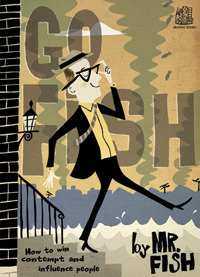
Truthdig editors interviewed esteemed editorial cartoonist Dwayne “Mr. Fish” Booth, whose new book, “Go Fish: How to Win Contempt and Influence People,” is out from Akashic Books. The artist talks about his craft, his inspiration, and the man behind the brilliant, wild and provocative cartoons.
Listen to the audio here or read the transcript below.
This interview was originally broadcast on Truthdig Radio.
This is Kasia Anderson, associate editor at Truthdig, and I’m here with Truthdig Editor-in-Chief Robert Scheer. And we are very pleased to be talking with the esteemed Mr. Fish, otherwise known as Dwayne Booth, whose new book, “Go Fish: How to Win Contempt and Influence People,” is out from Akashic Books—and who will also be, we should add, having his own one-man show at the Robert Berman Gallery in Santa Monica at Bergamot Station on August 6th, for all you locals listening. How’re you doing, Dwayne?
Mr. Fish: I’m doing great. How are you doing?
Robert Scheer: How come—you know, let me ask you—this is Scheer. You know, you …
Kasia Anderson: Who else would it be?
Robert Scheer: … you have the raunchiest, scatological, you know, cartoons; the wildest, the … and every time I talk to you on the phone, you’re Mr. Reasonable, you know, in the suit. What are there, two Fishes?
Mr. Fish: Ah … I’ve heard that so often. And I was actually just in New Hope [Pa.] doing a sidewalk selling of the book. They set me outside on just a rickety table; I looked like a fortune teller out there with my book. And, yeah, I looked like, ah … you know, a benign, Christian…
Kasia Anderson: Nerd. [Laughs]
Mr. Fish: … you know … glasses, big smile on my face. And I found that all I was attracting were, you know, old, elderly, retired people who came up to me and they thought that it was darling that I had my book there [Laughter], and that it was neat, and then they would look at it …
Kasia Anderson: And swell!
Mr. Fish: … and, yeah. I had a woman who actually opened it and said that I should be ashamed of myself.
Robert Scheer: Oh! [Laughs]
Kasia Anderson: Well, I just opened one page at random, and I see a young girl with an appendage that she shouldn’t have. So, yeah, it seems like any …
Robert Scheer: All right, first of all, we have to set some ground rules here. This is Pacifica Radio, and the FCC can come crashing down. So we’re not going to use …
Kasia Anderson: I said “appendage.” Calm down.
Mr. Fish: Right.
Robert Scheer: OK, but we’re not going to use the words that Mr. Fish routinely uses in his cartoons …
Kasia Anderson: Yes, but we will lay an enticing groundwork for people to just have to get their hands on this book, so.
Robert Scheer: … OK. …
Kasia Anderson: How’s that, Dwayne?
Mr. Fish: Yes, put it under your mattress when you get it.
Kasia Anderson: I should also mention: Congratulations to Mr. Fish, because he’s been a two-time winner of the Society of Professional Journalists’ [Sigma Delta Chi] editorial cartooning award.
Mr. Fish: I’m an establishment now. I mean, all this talk about me being …
Kasia Anderson: Yeah, you’re no longer a renegade, and …
Robert Scheer: Well, that is interesting. Having worked for the Los Angeles Times for 30 years, and having been a great friend of the late Paul Conrad, who won three Pulitzers, a number of other prizes, and so forth … for listeners, they should know that the Sigma Delta Chi Award is probably the most important award in journalism. Because it’s really coming from your peers; it’s very much sought-after. And the fact that a guy as crazy, wild and nutty, and radical as you are should get that prize shows—what? That they’re opening up a little bit, or that they’re willing to entertain—what do they tell you when you go to these conventions, like in Las Vegas, to get your award? Have they actually looked at your cartoons?
Mr. Fish:
Yeah. They’ve looked at them, and I think that more and more, you know, the assumed insanity that I depict is a reflection, more than me interpreting in some sort of outlandish way what’s going on.
Robert Scheer: So it’s the world that’s pornographic, not you?
Mr. Fish: Exactly.
Robert Scheer: I see, OK …
Mr. Fish: I’m just …
Robert Scheer: … you’re just the messenger. Let me ask you, and then I’ll let Kasia take over—but I’ve known a number of cartoonists in my day: the great Jules Feiffer; we run [Mike] Luckovich, who I think is very good, on our site; Ed Sorel, who I think is a raving genius. You know, there’s—and help me here, Dwayne—but you can go back to the French Revolution; who was it, Dumont, or …
Mr. Fish: Daumier.
Robert Scheer: … Daumier, and I remember as kid even, going to the museum once, they had an exhibit of his work. And you’re really—and I’m not flattering you, now—I think you’re really up there with the greats. And I was just curious, what drives you? I mean, I first saw your work in, I guess, the LA Weekly and Harper’s, and we’re really privileged to be able to feature the uncensored Fish, Mr. Fish, on Truthdig. But you know, really, where do you get your views? What … where do you come from? Who are you? [Laughter]
Mr. Fish: Well, I think what differentiates me from other cartoonists that I’ve spoken to, and just looking at their work, is that I go after … I address political problems that are in the culture, but not from a political point of view; I like to respond to tragedy emotionally, and I don’t feel like I want to fight a particular political party by standing in line with another political party. You know what I mean? I mean, for me, it’s a humanitarian stance. I don’t consider myself left, I don’t consider myself right; I get hate mail equally from both sides. And I think that a lot of political cartooning is really just arguing an existing, establishment point of view. It’s basically getting your side of the aisle to, you know, you’re cajoling them to gently agree with themselves. And that doesn’t change anything.
Robert Scheer: You’re being a little unfair, Mr. Fish … and please, don’t do a cartoon where you show my head up my behind, or something … [Laughter]
Kasia Anderson: It’s imminent! You’re asking for it. [Laughter]
Robert Scheer: … I know I’m asking for it, but you can hardly say that Ed Sorel, or Jules Feiffer, or certainly Paul Conrad were party-line guys. But there is, I will say, to your work, an element that you haven’t addressed: There’s a wildness to it. You’re kind of like Allen Ginsberg and the beats. There’s an extreme perception here, and again … that’s why I brought up your gentle demeanor, and so forth, your bookish style. [Laughter] But where does this wild, crazy, raging passion come from?
Mr. Fish: It probably comes from just the tradition in fine art to serve the art when you’re creating something. So if you want to do something that you think should be excessively beautiful, then you just pull out all the stops. And it’s the same thing with political conversation, and stuff; I don’t have any … I’m not going to self-censor … how can I say this? …
Kasia Anderson: How many times are you asked this question, in particular? Out of curiosity? Explain yourself! What is it that you do?
Mr. Fish: [Laughs] Yeah, usually it’s fighting words that ask me to explain myself, and it’s easier to respond. [Laughter] But yeah, I mean, it’s like I said. Especially when it comes to points of cultural discussions and political discussions, I think people tend to pull their punches and be a little bit too polite, when in the way I see things, it’s politics that screw things up more than anything else. Organized ignorance is the most destructive sort of thing. And I don’t think that … I have a certain impatience for walking that line and allowing somebody the right to their opinion if it is—if I can see down the road that it’s going to allow fracking to happen, for instance. [Laughter] Here in Pennsylvania … there’s just, like I said earlier, there’s humanitarian issues that demand the response of a human being. And if there is something dire and something desperate going on, then you should be screaming a little bit.
Kasia Anderson: Well, back to your book, “Go Fish: How to Win Contempt and Influence People.” I was a little bit startled when I first opened the book and saw that your introduction kicks off with a discussion of Elisabeth Kübler-Ross’ “On Death and Dying,” and the five stages of grieving. Can you elaborate on your choice there?
Mr. Fish: Well, I knew that I wanted to have a book that wasn’t just, like, the 101-things-to-do-with-a-dead-cat, zippy-cartoon type collection, where it was just either arranged according to the year the cartoon was produced, or anything like that. So I was hoping for some organizing principle to have a framework. And it happened almost immediately; I mean, I sat down and I said, why do I do what I do?—which I guess you just asked me; maybe this will help answer that. And I just felt the weight of the world all of a sudden, because [Laughs] that’s what I feel like I do, you know? Sort of like attack anything I can, or try to understand everything I can about existence. And then it just popped into my head, and I was just like, oh, the five stages would be interesting to break this down. And then I realized, in an instant, if I reversed the order and began with acceptance, and went to depression and then bargaining and then anger and then denial, it actually explained my process of work. You know, you wake up and you accept the fact that the world is how it is; and that is reality. And then with that acceptance comes a certain amount of depression, because it’s not all great, and there’s a lot of suffering that’s going on. And then you have to bargain your way through how you’re going to affect change or not affect change. And then you’re angry because what you do, it’s very incremental; you know, saving the world and avoiding doomsday. And then at the end of the day, you’re in denial in a couple of different ways; you’re in denial with the fruitlessness of your quest to change things, and you’re also in denial that you’re ever going to be able to do that. And the only way you’re going to be able to get up the next morning is if you are in denial. And that allows you to sleep, and then you can begin the process all over again.
Kasia Anderson: Is there anything that you won’t cover in your editorial cartoons? Are there any topics that are off-limits to you, that you’re aware of?
Mr. Fish: Um … the metric system. I, just, that’s very boring to me.
Kasia Anderson: I knew I was going to get something like this. [Laughter]
Robert Scheer: Tell me something about your experience with publishers. You were with the LA Weekly … first of all, I mean, when did you learn you could draw, and how did you get into this whole thing? … and then you’ve been at Harper’s, you’ve been at LA Weekly, and then what happens? Ownership changes, and you get pushed out, or how does it work?
Mr. Fish: Right. For the LA Weekly, yeah, that’s what happened; it was … the ownership changed, and then … I was just no longer needed there. But let’s go back to the drawing part of that question, because one thing, I’ve always been able to draw; and I always found an audience with that ability. So it was built in. So all through school, starting in grammar school, the teachers would actually bring me around and show my sharks and skeletons—which is what I was drawing a lot of then—to different teachers and to different faculty, because they thought it was really, really good. And I used to draw all of these things on black construction paper with white chalk, which nobody was doing at that time. And so I found that if you can draw really, really well, at least you’re going to stop somebody to admire the craft of what you do; and if you can stop somebody long enough, you can engage them in some sort of conversation.
Kasia Anderson: Well, we have the whole conversation right in front of us in your new book, “Go Fish: How to Win Contempt and Influence People.” And local L.A. types can stop by Bergamot Station on August 6th at the Robert Berman Gallery in Santa Monica to see more of your work. That’s all we have time for today. I’m Kasia Anderson, this is Truthdig Radio, and Robert Scheer and Mr. Fish, aka Dwayne Booth. Thanks for your time, Dwayne.
Mr. Fish: Thanks a lot.

|
Click here to check out Mr. Fish’s debut collection of political cartoons and essays, “Go Fish: How to Win Contempt and Influence People.”For all you Los Angeles locals: Join Mr. Fish and Robert Scheer at an opening reception featuring original drawings, prints and paintings by Mr. Fish on Saturday, Aug. 6, at 6 p.m. at Bergamot Station in Santa Monica. Fish will sign and discuss his new book, and 10 percent of all opening night sales will benefit Truthdig. Brought to you by Robert Berman Gallery in conjunction with Truthdig. Click here to view the invitation. |
Independent journalism is under threat and overshadowed by heavily funded mainstream media.
You can help level the playing field. Become a member.
Your tax-deductible contribution keeps us digging beneath the headlines to give you thought-provoking, investigative reporting and analysis that unearths what's really happening- without compromise.
Give today to support our courageous, independent journalists.
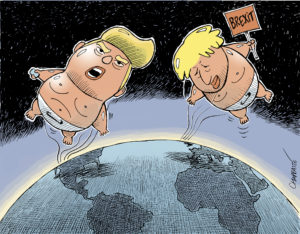
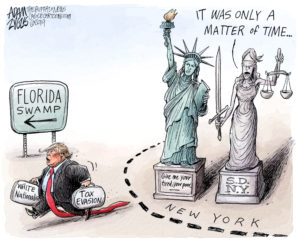
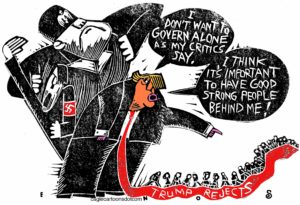
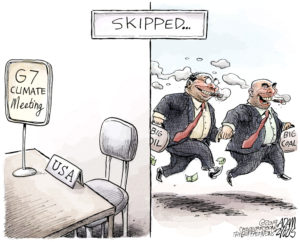
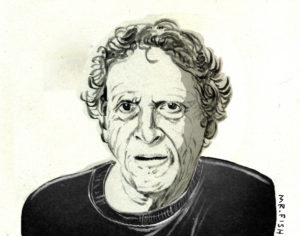

You need to be a supporter to comment.
There are currently no responses to this article.
Be the first to respond.